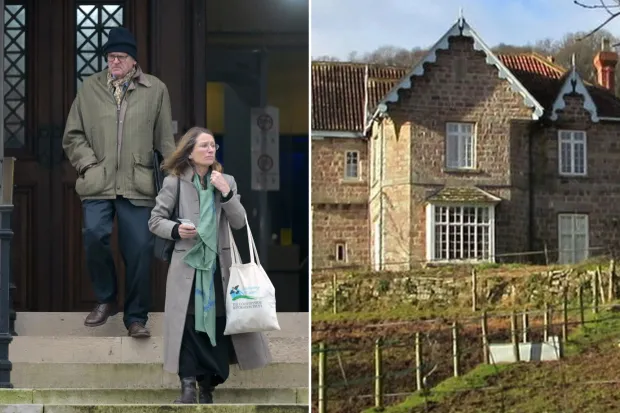What started as a routine day of gardening on a grand country estate turned into a devastating loss that has now landed a wealthy couple in court.
Paul Marsden, a 48-year-old gardener described as dedicated and hardworking, never returned from his morning round on the grounds of a £2.5 million mansion in Monmouthshire, South Wales.
He had even brought along a cake to share with his co-worker, planning to enjoy it with a cup of coffee later that day.
But that moment never came.
Fatal Accident on a Luxury Estate
Marsden had been working on the sprawling 15-acre property owned by Nicholas and Anthea Prest since 2013.
On that fateful April morning in 2020, he was using a quad bike to spray weed killer around the couple’s farmland near Llandogo when something went terribly wrong.
The machine overturned, trapping him underneath.
When a colleague went looking for him around 1:30 p.m., he discovered Marsden’s lifeless body under the quad bike.
A post-mortem later revealed the cause of death as asphyxia.
Court Hears of Lapses in Safety and Training
The ongoing trial at Newport Crown Court has painted a grim picture of safety practices on the property.
Prosecutor James Puzey KC told the court that the Prests failed in their legal duty to protect workers operating on their land.
According to him, they had “a clear responsibility to ensure workers were safe” but neglected crucial steps that could have prevented the fatal accident.
Investigations by the Health and Safety Executive (HSE) reportedly found that the quad bike’s use was “seriously unsafe.”
The machine was operated on uneven, sloped terrain, with no suitable safety precautions in place.
Puzey argued that Marsden hadn’t received any formal training to operate the quad bike, nor had he been given protective equipment like a helmet or gloves.
The Unchecked Risks Behind the Quad Bike
The prosecutor further explained that several compounding factors made the situation dangerous.
The land was described as steep and rough, and the quad bike carried a heavy herbicide tank that could have made it unstable.
According to Puzey, “there were a series of factors that increased the risk of an accident, and Mr and Mrs Prest would have and should have done something to control that risk.”
The court also heard that the Prests rented 42.6 acres of farmland near their home for £27,500 per term, using the space for cattle grazing.
They also received agricultural funding payments of £16,651 in 2020.
Charges Against the Prest Couple
Nicholas Prest, 71, and his wife Anthea, 70, are not facing manslaughter charges.
However, they are each accused of two violations under the Health and Safety at Work Act relating to Marsden’s death.
The first charge claims the couple failed to ensure that Marsden and other workers had sufficient training and protective equipment for using all-terrain vehicles.
The second accuses them of not confirming whether the quad bike itself was safe for use and free from potential risks to workers.
Defence Argues Marsden Worked Independently
In response, defence lawyer Keith Morton KC contended that Marsden was a self-employed contractor responsible for his own safety.
He suggested that the couple did not have the same legal obligations toward him as they would for a direct employee.
Mr Prest, a former Ministry of Defence official who later became chairman of the defence technology company Cohort, and his wife Anthea, a mother of three, have long been known for their charitable endeavors.
They’ve hosted several fundraising garden parties at their Pilstone House residence, supporting causes such as the NHS and aid for Ukraine.
The Trial Moves Forward
As the trial continues, the court will have to determine whether the Prests failed in their duty of care or whether Marsden’s tragic death was the result of an unfortunate accident on rough terrain.
The case has sparked renewed discussion about the safety responsibilities of wealthy homeowners who employ self-employed workers on large estates.
Share on Facebook «||» Share on Twitter «||» Share on Reddit «||» Share on LinkedIn
